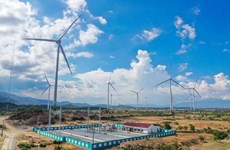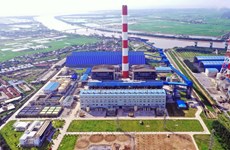Hanoi targets increased growth
Hanoi hopes to develop its economy by 7 to 7.5 percent annually between
2016 and 2020, said Chairman of the city's People's Committee, Nguyen
The Thao, during a recent interview with Vietnam News Agency.
Hanoi hopes to develop its economy by 7 to 7.5 percent annually between
2016 and 2020, said Chairman of the city's People's Committee, Nguyen
The Thao, during a recent interview with Vietnam News Agency.
Thao also said Hanoi needed to reduce its poverty rate by 1.5 percent annually.
He said the capital, as a leading economic centre, should focus on maintaining economic stability and controlling inflation that is why it had set targets to help the nation become industrialised by 2020.
Thao said Hanoi's economic growth had historically been high and that it had risen one-and-a-half times faster than in the rest of the country. In the past three years, it grew 9.17 percent.
The rate of mobilising social capital continued to rise by 16.36 percent per year. The city also attracted 2,806 business projects with a total value of 21.1 billion USD.
The city had implemented national programmes providing vocational training and creating jobs for workers.
Each year, the city had created jobs for 137,000 labourers, keeping the unemployment rate below 4.8 percent last year.
Thao also said the city had helped lift 16,500 to 20,000 households out of poverty. By the end of last year, there were 59,360 low-income households.
Planning, infrastructure development and urban management remain high on Hanoi's list. The city has expanded many new roads, such as Hoang Quoc Viet, Nguyen Chi Thanh, Tran Khat Chan and Dai Co Viet.
The city also paid attention to rural infrastructure. It removed temporary classrooms from schools. In 2012 and 2013, it installed about 10,000 water treatment machines in 10,000 low-income households in Thanh Oai, Thuong Tin, Me Linh, Ung Hoa, Phu Xuyen and My Duc districts.
The Government carried out 37 projects to mark the 60th anniversary of the city's Liberation Day. Seven have been completed and 22 others will be concluded by the end of next year, he said.
Nguyen Van Ha, a Vietnamese man living in the Czech Republic, said he was impressed to see Hanoi producing more commercial centres, banks and trade.
"I will invest in the city," he said. "I will introduce the city to my friends who are seeking a good place for investing."
But the city's urban planning and management remain weak, said Bui Xuan Tung, Deputy Head of the municipal Department of Planning and Architecture.
Skinny houses posed a safety threat, so the city should write more regulations on building such structures, Tung said.-VNA
Thao also said Hanoi needed to reduce its poverty rate by 1.5 percent annually.
He said the capital, as a leading economic centre, should focus on maintaining economic stability and controlling inflation that is why it had set targets to help the nation become industrialised by 2020.
Thao said Hanoi's economic growth had historically been high and that it had risen one-and-a-half times faster than in the rest of the country. In the past three years, it grew 9.17 percent.
The rate of mobilising social capital continued to rise by 16.36 percent per year. The city also attracted 2,806 business projects with a total value of 21.1 billion USD.
The city had implemented national programmes providing vocational training and creating jobs for workers.
Each year, the city had created jobs for 137,000 labourers, keeping the unemployment rate below 4.8 percent last year.
Thao also said the city had helped lift 16,500 to 20,000 households out of poverty. By the end of last year, there were 59,360 low-income households.
Planning, infrastructure development and urban management remain high on Hanoi's list. The city has expanded many new roads, such as Hoang Quoc Viet, Nguyen Chi Thanh, Tran Khat Chan and Dai Co Viet.
The city also paid attention to rural infrastructure. It removed temporary classrooms from schools. In 2012 and 2013, it installed about 10,000 water treatment machines in 10,000 low-income households in Thanh Oai, Thuong Tin, Me Linh, Ung Hoa, Phu Xuyen and My Duc districts.
The Government carried out 37 projects to mark the 60th anniversary of the city's Liberation Day. Seven have been completed and 22 others will be concluded by the end of next year, he said.
Nguyen Van Ha, a Vietnamese man living in the Czech Republic, said he was impressed to see Hanoi producing more commercial centres, banks and trade.
"I will invest in the city," he said. "I will introduce the city to my friends who are seeking a good place for investing."
But the city's urban planning and management remain weak, said Bui Xuan Tung, Deputy Head of the municipal Department of Planning and Architecture.
Skinny houses posed a safety threat, so the city should write more regulations on building such structures, Tung said.-VNA











